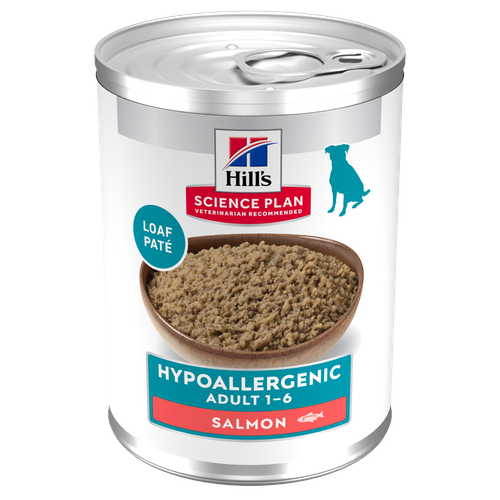
-
Find the right food for your petTake this quiz to see which food may be the best for your furry friend.Find the right food for your petTake this quiz to see which food may be the best for your furry friend.Featured products
 Adult Wet Dog Food with Beef
Adult Wet Dog Food with BeefHill's Science Plan Adult Multipack Wet Dog Food with Chicken, Beef & Turkey are complete premium pet foods for adult dogs from 1 year. Your dog will love these deliciously smooth and savoury minced loaves, formulated for balanced nutrition and overall health.
Shop Now Puppy Food
Puppy FoodHill's Science Plan Puppy Multipack Wet Dog Food with Chicken & Beef are complete premium pet foods for growing puppies from weaning until 1 year old and for pregnant and nursing dogs. Your puppy will love these deliciously smooth and savoury minced loaves, formulated for balanced nutrition and overall health.
Shop Now Mature Adult Dog Food
Mature Adult Dog FoodHill's Science Plan Mature Adult Multipack Wet Dog Food with Chicken & Beef are complete premium pet foods for mature adult dogs from 7 years. Your dog will love these deliciously smooth and savoury minced loaves, formulated to deliver the appropriate amount of energy to support the needs of adult dogs.
Shop NowFeatured products Light Adult Multipack Wet Cat Food with Chicken & Ocean Fish
Light Adult Multipack Wet Cat Food with Chicken & Ocean FishTender chicken chunks in gravy for cats, with L-carnitine and fewer calories for ideal weight management. Packed with high-quality protein, omega-6s, and vitamin E for shiny fur and healthy skin.
Shop Now Mature Adult Wet Cat Food with Chicken
Mature Adult Wet Cat Food with Chicken
Tender chicken chunks in gravy for mature adult cats. Made with easy-to-digest ingredients, high-quality protein for lean muscle maintenance and antioxidant vitamins C+E for optimal health.
Shop Now Adult Multipack Wet Cat Food with Beef, Ocean Fish & Chicken
Adult Multipack Wet Cat Food with Beef, Ocean Fish & ChickenTender chunks in gravy for cats, with high-quality protein to maintain lean muscle. With vitamin E and omega-3s & -6s for healthy skin and balanced minerals to support healthy vital organs.
Shop Now -
Dog
- Dog Tips & Articles
-
Health Category
- Weight
- Food & Environmental Sensitivities
- Urinary
- Digestive
- Joint
- Kidney
-
Life Stage
- Puppy Nutrition
- Adult Nutrition
- Senior Nutrition
Cat- Cat Tips & Articles
-
Health Category
- Weight
- Skin & Food Sensitivities
- Urinary
- Digestive
- Kidney
-
Life Stage
- Kitten Nutrition
- Adult Nutrition
Featured articles The Incredible Science Behind Your Pet's Microbiome
The Incredible Science Behind Your Pet's MicrobiomeLearn what your pet's microbiome is, how it contributes to your pet's gut and overall health, and why nutrition is important in maintaining healthy microbiomes.
Read More Show some love with wet foods: a great choice for pets with health issues
Show some love with wet foods: a great choice for pets with health issuesShow some love with wet foods: a great choice for pets with health issues.
Read More The Right Diet For Your Pet
The Right Diet For Your PetIn people, the right diet is very important. If you are eating the wrong way for your metabolism, activity level, age and lifestyle you could end up with health issues.
Read More -


Dogs are notorious for eating things they aren't supposed to. Sometimes, this can lead to an upset stomach, vomiting and maybe diarrhoea. If your dog is otherwise healthy, an occasional upset stomach shouldn't cause concern. But if your dog has serious or frequent gastrointestinal problems, then it's time to seek your veterinarian's help. Being sick can rapidly cause dehydration and so can watery poop in the longer term. It’s better to be safe than sorry so if you’re ever worried about a digestive upset, always ask your vet for advice.
Signs That Your Dog Has an Upset Stomach
How do you know if your dog has an upset stomach? Many of the signs are similar to what you experience when your own tummy hurts. According to the PDSA, signs of a digestive upset (gastroenteritis) include:
- Diarrhoea, including stools of various colours such as green or yellow poop.
- Vomiting or retching
- Lack of appetite
- Tiredness or lethargy
- Fever
- Abdominal pain
The PDSA adds that your dog might show abdominal pain by yelping or growling when you pick them up or touch their tummy. They might also adopt the "prayer position", which is when they stand with front legs stretched out, hind legs up, and tail in the air. This also looks exactly like when they play bow.
Causes of stomach issues can be internal (inside the stomach) or external (outside the stomach). Internal causes for an upset stomach include dietary indiscretion (a fancy way of saying your dog ate something they shouldn't), food allergies, overeating, parasites, intestinal blockages, ulcers or tumours. External causes include pain, heatstroke, stress, liver or kidney problems, pancreatitis, hormonal issues, brain problems, inner ear problems or cancer.


Tasty Tips
How to Tell If Your Dog Has a Sensitive Stomach or an Upset Stomach That may Pass.

Some dogs have guts of steel — they can eat just about anything and not get sick. Other dogs will throw up if they nibble something even the least bit different from their regular food.
You can tell if your dog has a sensitive stomach by the frequency of signs. If your dog experiences any of the signs of an upset stomach on a frequent basis (once a month or more), then they may have a sensitive stomach.
The causes of a sensitive stomach aren't always easy to figure out, but possible causes range from food sensitivities and food allergies to changes in bacterial populations in the digestive system, called the gut microbiome.
Signs of a food allergies, in addition to those listed above, may also include skin problems, such as itchy red skin, hair loss and increased gut sounds.
What to Give a Dog With an Upset Stomach
How to treat your dog's upset stomach depends on the severity and its underlying cause. If pancreatitis is causing their upset stomach, for example, their treatment will be different from that for a dog whose upset stomach is a result of a food allergy. If your dog only has mild stomach upset, though, treatment may not be needed at all. The Blue Cross recommends consulting your vet to be on the safe side, especially if you have a younger dog or if the symptoms seem to worsen quickly.
Veterinarians have many options to help pets with an upset stomach. Depending on what your dog is suffering from, treatments might include anti-sickness or anti-diarrhoea medication, antacids, intravenous or subcutaneous fluids or deworming medicine. Some dogs require hospitalisation and/or surgery.
Proper Food Can Help

An important part of caring for an upset stomach includes feeding your dog the right food. The most reliable way to settle a stomach upset is to ask your vet for an easily digestible food to feed for a few days. These foods give your dog all the nutrients they need and your vet may want to tailor the choice depending on the severity. Once it’s all settled you can reintroduce their normal food over a couple of days.
Fortunately, there are many options available to help a dog with an upset tummy to feel better fast. Together with the help of your veterinary team, you can help your dog get over an upset stomach and get back to tail-wagging in no time at all!


Dr. Sarah Wooten graduated from UC Davis School of Veterinary Medicine in 2002. A member of the American Society of Veterinary Journalists, Dr. Wooten divides her professional time between small animal practice in Greeley, Colorado, public speaking on associate issues, leadership, and client communication, and writing. She enjoys camping with her family, skiing, SCUBA, and participating in triathlons.
Related products

Hill's Science Plan Hypoallergenic Adult Wet Dog Food with Salmon is a complete premium pet food for all adult dogs from 1 year. This savoury tinned loaf is specially formulated for dogs with delicate skin and stomachs. It features a single novel animal protein source and is grain-free.

Hill's Science Plan Puppy Multipack Wet Dog Food with Chicken & Beef are complete premium pet foods for growing puppies from weaning until 1 year old and for pregnant and nursing dogs. Your puppy will love these deliciously smooth and savoury minced loaves, formulated for balanced nutrition and overall health.

Hill's Science Plan Mature Adult Multipack Wet Dog Food with Chicken & Beef are complete premium pet foods for mature adult dogs from 7 years. Your dog will love these deliciously smooth and savoury minced loaves, formulated to deliver the appropriate amount of energy to support the needs of adult dogs.

Hill's Science Plan Adult Multipack Wet Dog Food with Chicken, Beef & Turkey are complete premium pet foods for adult dogs from 1 year. Your dog will love these deliciously smooth and savoury minced loaves, formulated for balanced nutrition and overall health.
Related articles

Learn about the potential health risks of a raw diet for dogs and why they aren't the best option for your pup or you.

Many human foods are dangerous to dogs. Read about 5 of the worst toxic food offenders that can kill your dog - and how much it takes to hurt them.

How, when and what to feed your new puppy is an important decision, learn more about the things to consider for feeding your puppy.

Learn effective tips for feeding a dog that's a picky eater and ensure proper nutrition for a finicky eater. Discover tips for pet parents at Hill's Pet UK.

Put your dog on a diet without them knowing
Our low calorie formula helps you control your dog's weight. It's packed with high-quality protein for building lean muscles, and made with purposeful ingredients for a flavourful, nutritious meal. Clinically proven antioxidants, Vitamin C+E, help promote a healthy immune system.
Put your dog on a diet without them knowing
Our low calorie formula helps you control your dog's weight. It's packed with high-quality protein for building lean muscles, and made with purposeful ingredients for a flavourful, nutritious meal. Clinically proven antioxidants, Vitamin C+E, help promote a healthy immune system.

